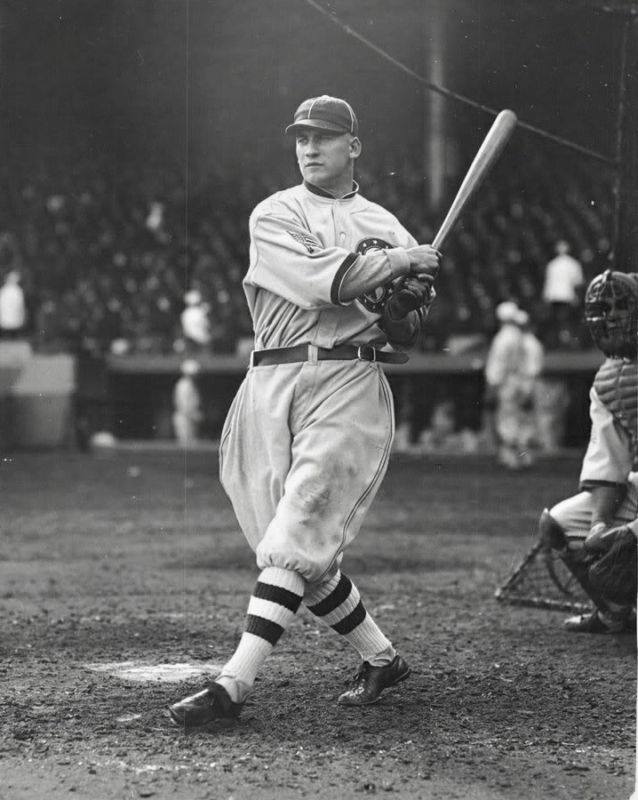Subscribe to Old Baseball Photos and Essays for automatic updates (sign-up block found in right side-bar)
As a Free Bonus for subscribing, you’ll get instant access to my two Special Reports: Memorable World Series Moments and Gary’s Handy Dandy World Series Reference Guide!
“Happy” Felsch Photo Gallery
Click on any image below to see photos in full size and to start Photo Gallery:
Spotlight on the Eight Men Out, Part Four: Oscar “Happy” Felsch
“Well, the beans are spilled and I think I’m through with baseball. I got $5,000. I could have got just about that much by being on the level if the Sox had won the Series. And now I’m out of baseball — the only profession I know anything about, and a lot of gamblers have gotten rich. The joke seems to be on us.” –Oscar “Happy” Felsch
I’m continuing my series on the eight ball players banned for life from baseball by Commissioner Landis in the wake of the 1919 Black Sox scandal. Today we turn our attention to the White Sox’ star center fielder, Oscar “Happy” Felsch.
Hap Felsch, who picked up his nickname early in life from his smiling, easy-going demeanor, played center fielder for the White Sox from 1915 to 1920. He was born in Milwaukee, Wisconsin, to German immigrant parents and began his professional baseball career in the Wisconsin-Illinois League in 1913. The next season, he batted .304 for the American Association Milwaukee Brewers, and was purchased by the White Sox.
Shop MLB.com. The Official Online Shop of Major League Baseball.
Over his career, Felsch hit .293 with 38 home runs, and 448 RBIs. His last season in the majors,1920, was his best. He hit .338 with 14 home runs and 115 RBIs. It’s likely he would have put up more big numbers in the live-ball era.
From 1916 to 1920, Felsch was one of the best hitters in the American League, hitting over .300 three times, and finishing in the top-10 in numerous offensive categories. His 102 RBIs in 1917 was good for second place, as the White Sox won the American League pennant and World Series. He missed most of the 1918 season due to military service.
The Fateful Year, 1919
Felsch continued his good hitting and fielding in 1919. He had a strong throwing arm and was highly regarded as an outstanding center fielder. He led the American League in outfield putouts and assists in 1919, as a strong White Sox team won another pennant.
That fall, Felsch joined a group of eight White Sox players that plotted to intentionally throw the 1919 World Series. He was reluctant to go along at first, but then eventually did because of the promised payoff. For his part in the fix, Felsch admitted receiving $5,000, which was more than his entire regular season salary of $2,750. After the scandal broke in late 1920, Felsch, along with seven other players, was banned from baseball by Commissioner Landis. Later, he admitted his knowledge of the plot and admitted taking money; but, similar to statements made by other implicated players, he denied he was involved in throwing any games.
He told the story of his part in the scandal on September 29, 1920. He largely substantiated the confessions made by Cicotte and Jackson; and in expressing regret for his action, said he saw nothing left in life for him. In 1925, Felsch, Risberg, and Jackson sued the White Sox for back pay. On February 9, 1925, he was awarded $1,166 in salary plus interest in a suit alleging breach of contract.
Life After Baseball
Felsch spent the next 15 years touring the country with various amateur and semi-pro teams, including Scobey, Montana Outlaws in 1925 and 1926; Regina Balmorals of the Southern Saskatchwan Baseball League in 1927; and in Plentywood, Montana in 1928. After his playing days ended, he opened up a grocery store as well as a number of drinking establishments. He was also a crane operator.
Oscar “Happy” Felsch died of a liver ailment in Milwaukee in 1964, just five days before his 73rd birthday
Gary Livacari
Photo Credit: All from Google search
Information: Excerpts Edited from the Oscar “Happy” Felsch Wikipedia page.’ and New York Times obituary.
Check out my two books, both now available on Amazon in e-book and paperback: “Paul Pryor in His Own Words: The Life and TImes of a 20-Year Major League Umpire”and “Memorable World Series Moments.” All profits go to the Illinois Veterans Foundation
Cast Your Vote in Our New Poll Question: How Do You Feel About Judge Landis’ Verdict Against the “Eight Men Out”? Let Your Voice Be Heard! https://wp.me/p7a04E-5IF
We are a participant in the Amazon Services LLC Associates Program, an affiliate advertising program designed to provide a means for us to earn fees by linking to Amazon.com and affiliated sites. Click here to view Amazon’s privacy policy

